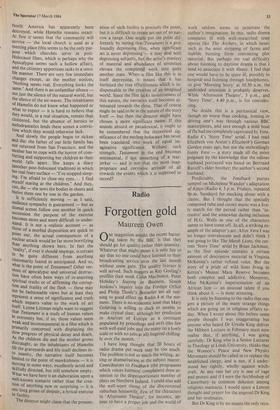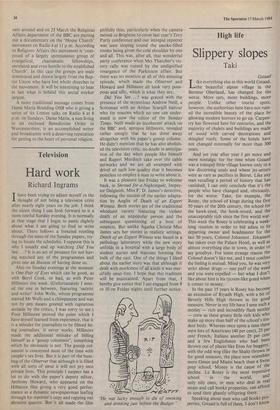Radio
Forgotten gold
Maureen Owen
ne suggestion amidst the recent batter- ning taken by the BBC is that they should go for quality rather than quantity. Whatever that might mean it is only fair to say that no one could have listened to their broadcasting service over the last month without some gain. The quality listener is well served. Such nuggets as Ray Gosling's profiles (last week Colin Maclnnes), Peter Hobday's Staying in Business, Simon Jenkins's inquiry into the Foreign Office and Philip Thody's Bestseller are all run- ning to good effect on Radio 4 at the mo- ment. There is no economic issue that Mary Goldring is willing to duck or unable to make crystal clear, although her prediction in Analysis of Europe as a continent populated by princelings and serfs (the few with well-paid jobs and the many on a lowly scale or with no jobs at all) lingered chilling- ly over the month.
1 have long thought that 20 hours of radio drama per week may be too much. The problem is not so much the writing, ac- ting or dramatisation as the subject matter. Contributors to Feedback (the programme which voices listeners' complaints) drew at- tention to the disproportionate number of plays on Northern Ireland. I could also add the well-worn theme of the discontented suburban housewife. Few of the characters in 'Afternoon Theatre', for instance, ap- pear to have a proper job and the world of work seldom seems to penetrate the author's imagination. In this, radio drama compares ill with well-researched soap operas like The Archers, in which issues such as the asset stripping of farms and stubble burning form convincing plot material. But perhaps my real difficulty about listening to daytime drama is that I -tend to associate it with illness. I feel that one would have to be quite ill, possibly in hospital and listening through headphones, to give 'Morning Story' at 10.30 a.m. the undivided attention it probably deserves. While 'Afternoon Theatre', 3 p.m., and 'Story Time', 4.40 p.m., is for convales- cing.
No doubt this is a puritanical view, though no worse than cooking, ironing or driving one's way through various BBC masterpieces, and sure enough a mild bout of flu had me completely captivated by Vera, Radio 4's 'Story Time' serial. I had read Elizabeth von Arnim's Elizabeth's German Garden years ago, but not the enthrallingly funny Vera — a story made all the more poignant by the knowledge that the odious husband portrayed was based on Bertrand Russell's elder brother; the author's second husband.
Predictably, the Feedback purists jumped on Michelene Wandor's adaptation of Kipps (Radio 4, 3 p.m. Fridays, repeated 9p.m. Sundays) for mucking about with a classic. But I thought that the specially composed tuba and cornet music was a live- ly match for the period rather than 'in- trusive' and the somewhat daring inclusion of H.G. Wells as one of the characters seems to have come off. In all, a striking ex- ample of the adapter's art. After Vera I was no longer convalescent and didn't think I was going to like The Marsh Lions, the cur- rent 'Story Time' serial by Brian Jackman, as the first episode contains a certain amount of descriptive material in Virginia McKenna's rather refined -voice. But the story of a pride of wild lions living in Kenya's Maasai Mara Reserve becomes both complex and addictive. Moreover, Miss McKenna's impersonation of an African lion — an unusual talent if you think about it — is most arresting.
It is only by listening to the radio that one gets a picture of the many strange things which are going on in religious affairs to- day. When I wrote about this before some people thought I was exaggerating but anyone who heard Dr Ursula King deliver the Hibbert Lecture in February must now realise that, if anything, I was going carefully. Dr King who is a Senior Lecturer in Theology at Leeds University, thinks that the Women's Peace and New Physics Movement should be called in to replace the established clergy, and is not, if I under- stood her rightly, wholly against witch- craft. At any rate her cry is one of rage and protest and if I were the Archbishop of Canterbury (a common delusion among religious maniacs), I would spare a Lenten thought and prayer for the angered Dr King and her soulmates.
But Dr King is by no means the only recu- sant around and on 23 March the Religious Affairs department of the BBC are putting out a documentary on the 'House Church' movement on Radio 4 at 11 p.m. According to Religious Affairs this movement is 'com- posed of a largely spontaneous group of evangelical, charismatic fellowships, unrelated and even hostile to the established Church'. In this case the groups are male dominated and drawn largely from the Bap- tist Union who have lost whole churches to the movement. It will be interesting to hear at last what is behind this social worker jargon.
A more traditional message comes from Dame Maria Boulding OSB who is giving a series of six Lenten talks on Radio 4 at 8 p.m. on Sundays. Dame Maria, a nun living in an enclosed Benedictine Order in Worcestershire, is an accomplished writer and broadcaster with a deserving reputation for getting to the heart of personal religion.















































 Previous page
Previous page